Our fellow foundations:
GHR Foundation | Enkel Foundation | Opus Foundation | Opus Prize
We acknowledge our presence on the traditional land of the Anishinaabe and Dakota People.
Dear Community,
Gerald and Henrietta Rauenhorst, founders of the Better Way Foundation, built a legacy of civic leadership, business impact, and philanthropy that continues today. Through their work and partnership over six decades, they exemplified what it means to be committed, thoughtful, and effective—grounded in humility, openness, and hard work.
At Better Way, how we engage is just as important as what we achieve. We strive to be a strong learning organization, continuously refining our approach to working alongside the nonprofits we support. By listening to our partners and others in the ecosystem, we deepen our understanding of the context, nuance, and history of Indian Country—where we have committed to directing 100% of our funding by 2026.
While nine years of funding in Indian Country has allowed us to listen, learn, and evolve, our greatest inspiration comes from our partners. They have made incredible strides in language revitalization, teacher development, and strengthening their operations. But what moves us the most are the stories of children gaining confidence and pride in their Indigenous identity—something not seen in generations, according to many partners.
Reciprocity and communality are core Indigenous values, shaping how we engage with partners, learn as an organization, and approach evaluation. In Indigenous cultures, giving and receiving feedback is a gift—a sign of respect and a commitment to relationship-building. We are grateful to Dakota language and history teacher, and Better Way partner, Vanessa Goodthunder for this insight.
As we reflect on 2024, we recognize the profound gift our partners continue to share with us—the opportunity to listen, grow, and do better together.
Warmly,
Karen Rauenhorst Nicholas Banovetz
Chair Executive Director
Our mission
A family foundation, rooted in catholic social values, Better Way Foundation invests in systemic, holistic, and evidence-based approaches that support the positive development of all children.
Our vision
Our partners are finding a better way to build a future where child well-being contributes to strong families and communities.
As stewards of philanthropic resources rooted in Catholic social values, our journey has been deeply meaningful. Our growing focus on Indian Country is driven by the inspiring solutions, relationships, and impact we’ve witnessed.
We are grateful to support the expansion of Indigenous early childhood programs and language revitalization—some communities now have fluent speakers for the first time in decades. This work has taught us to partner differently, honor community wisdom, and embrace learning as a gift.
Our partners embody perseverance, heritage, and strength. While Indigenous communities face ongoing underinvestment and disparities, we remain committed to uplifting their leadership and determination.
Beyond funding early childhood development, we see it as our responsibility to raise awareness and invite others to stand as allies in this work.
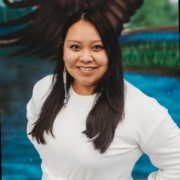
Our elders told us, Aƞpetu iyohi wówauƞṡida, daḳota wic̣oḣaƞ, waḳaƞyeża canteya yuha mauƞnipi kiƞhaƞ waṡaguƞkic’iyapte (Our compassion, our Dakota ways, and our love for our children, that’s what keeps us strong). – Vanessa Goodthunder, Daḳota Iapi Wauƞspewic̣akiya Itaƞc̣aƞ, Lower Sioux Indian Community
Culture blooms with early education
We are honored to collaborate with leaders and organizations whose vision for culturally holistic, community-led early childhood development uplifts families and preserves heritage. We invite you to get to know them and their impact!
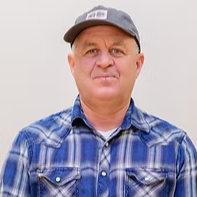
Language isn’t something to rank or measure—it’s lived, spoken, and central to identity and community. Indigenous perspectives honor the presence of language over proficiency, valuing its flow through babies, children, and the community.
In working alongside communities, Better Way supports this holistic growth, rooted in cultural and relational strength, without imposing rigid measures. – Ted Moomaw, Executive Director, Hearts Gathered
As humans, language is our gift—and responsibility. It’s how we understand, connect, and pass on knowledge through generations. Language has power. – Roxanne Brown, Ed.M., Mashpee Wampanoag Tribe Education Director (home of the Weetumuw School)
Today, few Native languages are widely spoken by children—a critical marker of community vitality and future. But the movement to preserve Indigenous heritage, culture, and language is growing. It’s also powerful.
The Waterfall School developed 80 instructional videos and adapted teaching methods, leading to 85% of students improving proficiency each quarter—advancing Okanogan Salish/Nsyilxcən. When Hearts Gathered opened the school 15 years ago, only five first-language speakers remained. Today, thanks in large part to the school, over 100 individuals are actively learning the language.
The NACA Inspired Schools Network, an incubator of 13 Native schools, Indigenized curricula now available as open-source materials on its Resource Hub.
Thunder Valley Community Development Corporation created 180 Lakota lesson plans and family resources to support language learning at home.
Similarly, Maȟpíya Lúta developed comprehensive Lakota curricula, now adopted by Oceti Sakowin Community Academy as it expands its school.
For example, Oceti Sakowin Community Academy’s first paraprofessional is on track to become a licensed teacher after the school launched an alternative teacher certification pathway with Oglala Lakota College.
The Indigenous Montessori Institute, for example, certified 48 educators.
The majority of partners retained their teams; 10 expanded them.
By taking a trauma-informed, holistic approach to mental health services, Little Earth Residents Association empowers families to break cycles of intergenerational trauma.
Now in its second year, 150 young children are on their path to healing and resilience.
At Thunder Valley CDC, students and staff find healing and connection through language and cultural traditions, engaging in ancestral practices like harvesting PleziNota (sage), ChapDá (chokecherry, meaning “bitter wood”), and Chansása (red willow).
Educators in the NACA Inspired Schools Network feel supported, rating identity development through cultural knowledge opportunities 4.9/5.
Our partners create transformative opportunities for children and families, strengthening their communities. Their efforts nurture leaders and organizations that safeguard sacred knowledge, preserving cultural heritage and traditions for future generations.
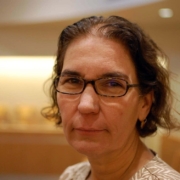
Better Way investments equip leaders and organizations with resources to safeguard and celebrate cultural heritage. By investing in Indigenous languages, traditions, and values, our partners lay the groundwork for thriving communities. This work strengthens intergenerational ties, fostering resilience and well-being that will endure far into the future. – Anita Fineday, Board Member
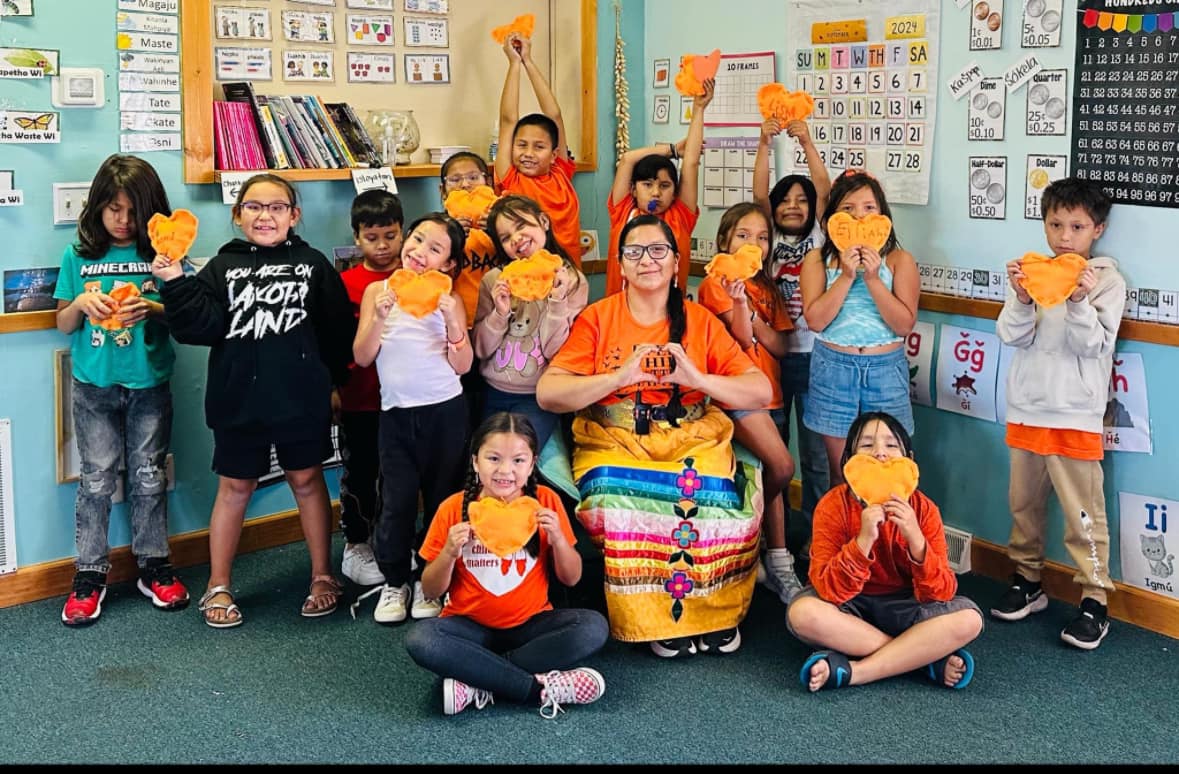
Early childhood is a vital time for development, making it ideal for nurturing Indigenous languages, cultures, and traditions. These programs instill cultural pride, enhance emotional well-being, and support strong educational and health outcomes.
Dr. Nitana Greendeer: A sustainability boost for Weetumuw School
Children are already culture keepers at Weetumuw Katnuhtôhtâkamuq, a Wôpanâak language immersion and cultural Montessori-based school for students ages three to nine. When my daughter hears me speaking English, she says, “Speak Wôpanâak!”
The sole act of speaking Wôpanâak reflects the determination and resilience of the Wampanoag: We are the first tribe in U.S. history to effectively revitalize our Native language after having no first-language or fluent speakers for many years. The Mashpee Wampanoag people were the first point of contact during colonization; my ancestors met the Pilgrims on the shores of present-day Massachusetts.
Today, opioid addiction is another epidemic that has disproportionately affected our community. At Weetumuw we believe the best investments we can make to overcome intergenerational trauma–a leading cause of addiction–are investments in early childhood development.
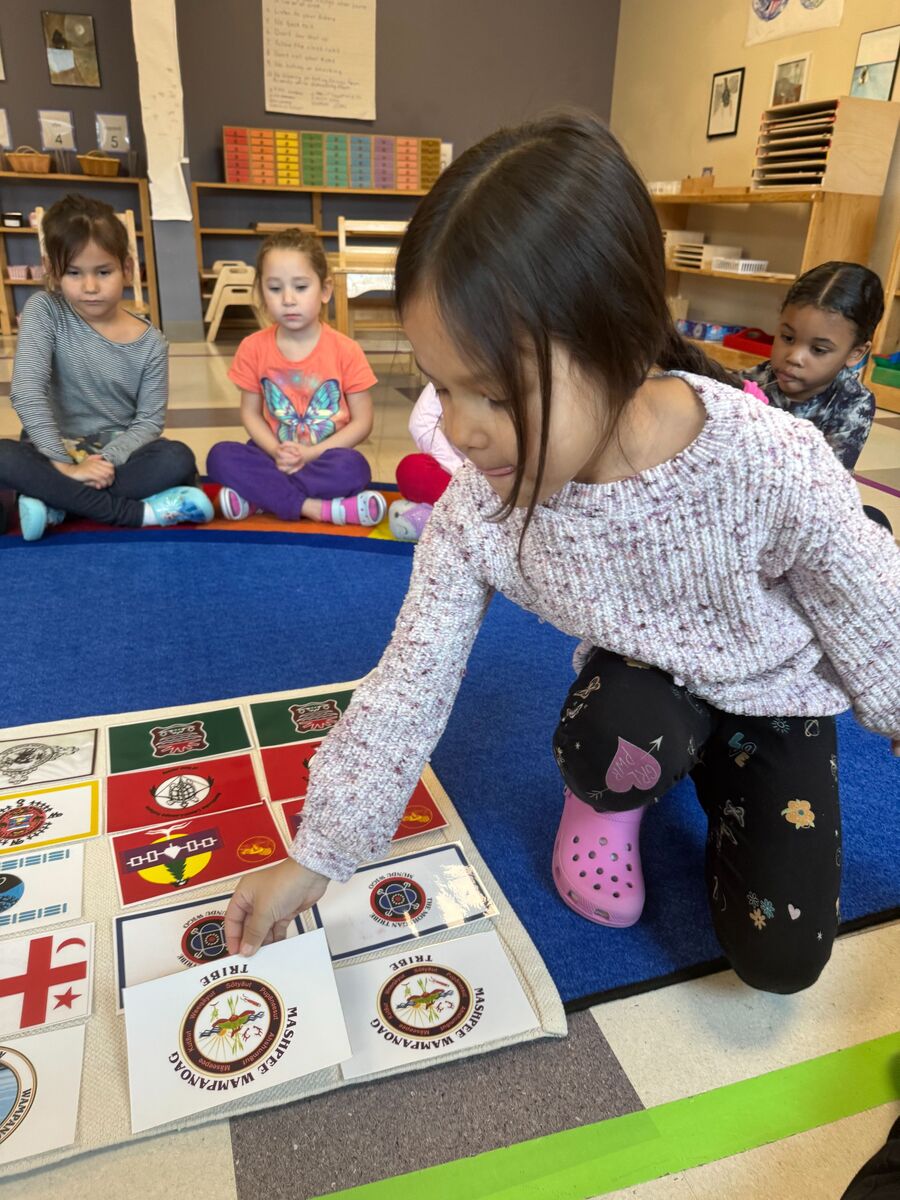
Weetumuw student identifies Tribal Nation flags.
Basing education in Indigenous knowledge nurtures a strong sense of identity and belonging. Incorporating traditional teachings into the classroom enriches the learning experience while using ancestral languages like Wôpanâak strengthens cognitive abilities and cultural continuity.
Together with our families, we envision a stronger future for our school and tribe. We reject the assumption that addiction is an issue Indigenous people will always face; yet we know we have to start with the children. Infusing cultural pride, confidence, and community building into our children’s educational and developmental foundation will increase their resilience.
Through partnerships with Indigenous language immersion schools like Weetumuw, philanthropic leaders show they, too, understand the healing power of culture, language, and community. Thanks to their support, we are strengthening our curriculum by developing 420 lessons in collaboration with Wampanoag knowledge keepers to provide a continuous learning experience without repetition. Our teachers also have and will continue to receive language training, enhancing their fluency and ability to deliver the new curriculum. Additionally, with Better Way’s support, we are building our capacity for fundraising and community outreach to ensure our financial sustainability.
For the first time since we started in 2016, we retained 100% of our teachers; their passion and focus on the needs of students combined with the commitment of Weetumuw families propel our work. Collectively, we understand that to break generational trauma and thrive, we must build strong generations less affected by the harm inflicted on us and focus on our cultural pride and traditions. Together we recognize that culture and early childhood education are the key.
Dr. Nitana Greendeer is an educator, linguist, and researcher who serves as the head of school for Weetumuw Katnuhtôhtâkamuq.
Fawn YoungBear-Tibbetts: Centering Indigenous languages and foods with young children
My father taught me to butcher deer, harvest berries and greens, and catch walleye and whitefish growing up near Leech Lake, as a member of the White Earth Band of the Minnesota Ojibwe Tribe. By age 10, I could butcher a deer or fillet a fish on my own. We spoke Ojibwe at home and in the community. Today I share my knowledge with children and families connected to the Minneapolis-based Wicoie Nandagikendan, the first urban Indigenous early childhood immersion program.
The Indian Relocation Act of 1956 pushed many Native people in the United States to urban areas, disconnecting us from our land, culture, languages, and food systems. Today Minneapolis is leading urban efforts around reintroducing Indigenous foods and revitalizing languages such as Ojibwe and Dakota, the languages Wicoie Nandagikendan includes in our two immersion classrooms. Since our start in 2006, we’ve helped develop 75 language immersion teachers using a master/apprentice model. Plus, we’re currently training seven licensed language immersion early childhood teachers, among the first in the state.
Thanks to the Better Way Foundation, we’ve strengthened professional development for our lead teachers and apprentices. We’ve also increased student scholarships so more children and families can benefit from our culturally rich early childhood experience. To further boost scholarship funding, we rented the commercial kitchen at Little Earth Residents Association, and catered local events to generate revenue. In 2024, we raised $9,000 for student scholarships.
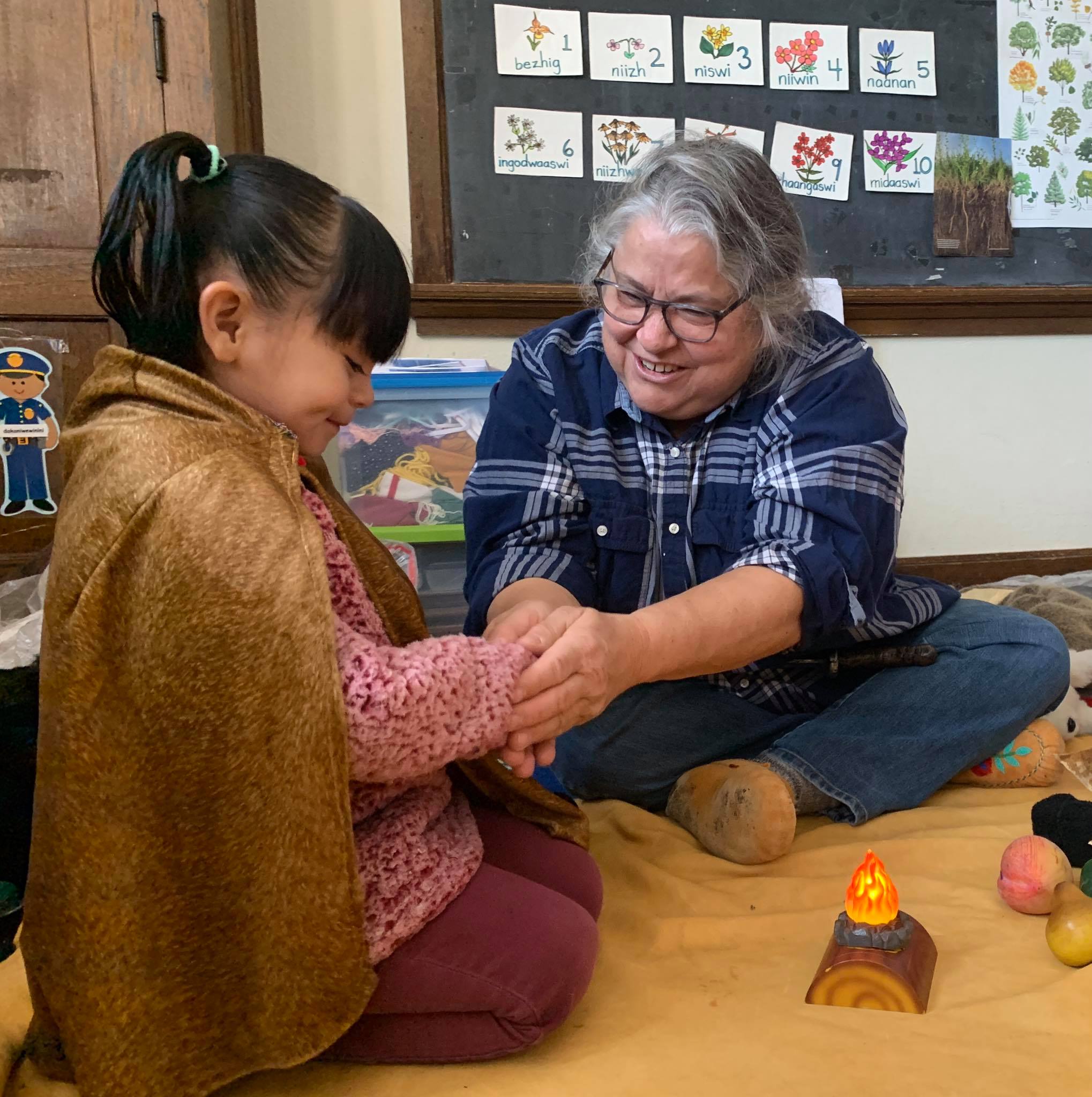 This past year at a community event, I saw one of our apprentices and her daughter, Jordan, who is a Wicoie Nandagikendan student. While waiting in the feast line, Jordan spoke only Ojibwe, a moment that deeply resonated with me
This past year at a community event, I saw one of our apprentices and her daughter, Jordan, who is a Wicoie Nandagikendan student. While waiting in the feast line, Jordan spoke only Ojibwe, a moment that deeply resonated with me
In education, we often think about measuring cultural competence in children. For me, this is embodied in seeing a young child only speaking her Native language in the community, a little boy putting his tobacco on the fire depicted on our classroom rug, or the children clamoring for me to “make them bones” as they eagerly anticipate the ribs we prepare for lunch.
As my role at Wicoie Nandagikendan has evolved from Indigenous Food Coordinator to Executive Director, I have appreciated the guidance, training, and mentorship our foundation and community partners offer. Together, we’re strengthening Wicoie Nandagikendan’s capacity, helping us make an even bigger impact in the lives of our children and families.
Fawn YoungBear-Tibbetts is the executive director of Wicoie Nandagikendan Early Childhood Urban Immersion Program and leads its work with Our Sacred Foods Project, a community food sovereignty initiative
Annette Romans: Teachers and students gain from increased professional development
Wíŋyaŋ Wakȟáŋ Owáyawa is part of the American Indian Catholic Schools Network which includes eight former boarding schools that serve 16 Tribal communities. Among other initiatives, AICSN partners with Holy Cross College to offer an alternative Bachelor of Arts completion program that caters to the specific needs of teachers in Indigenous network schools. There’s also a Transition-to-Teaching track for teachers with a BA in another field seeking elementary education licensing.
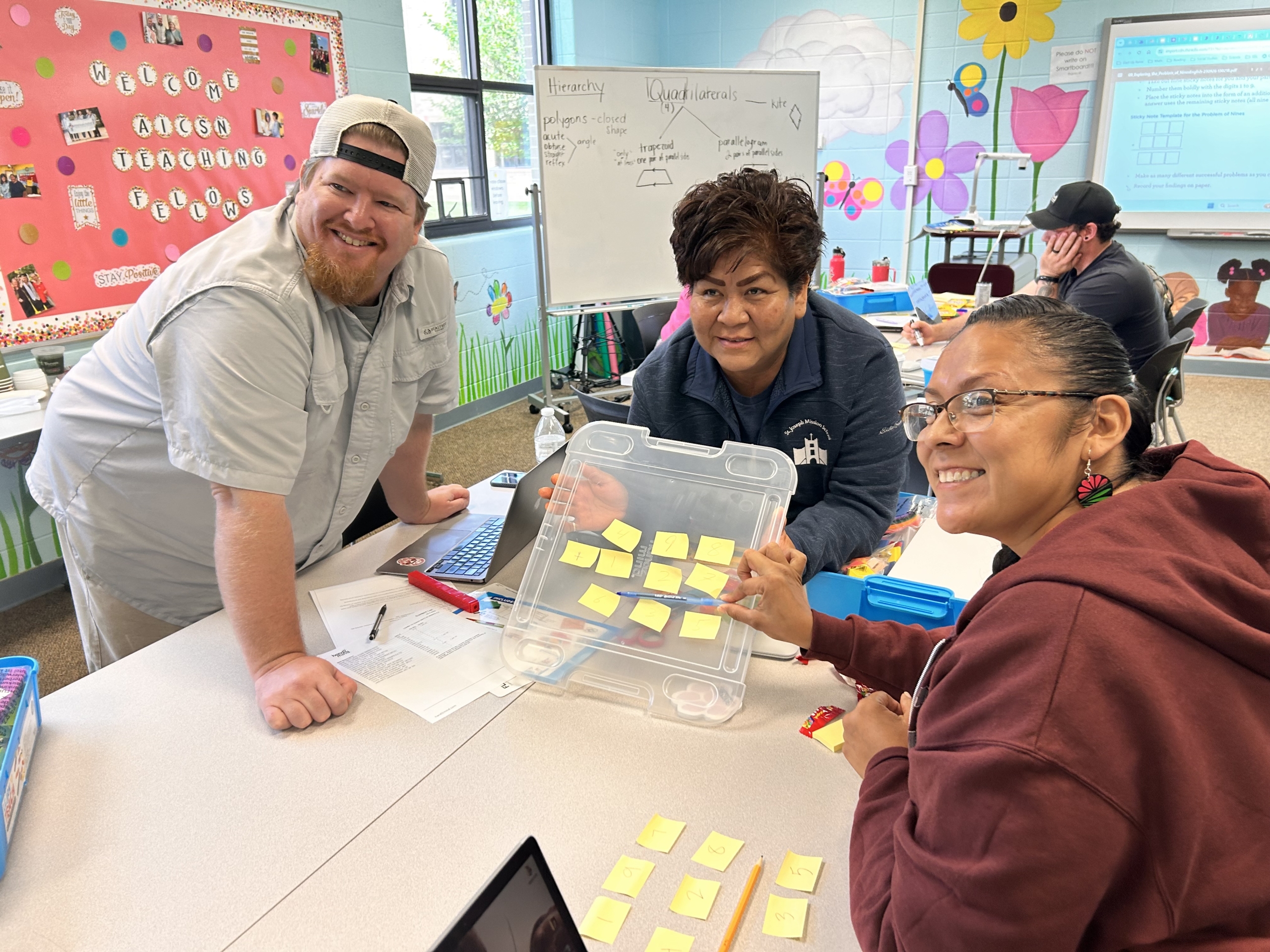
Teachers in the AICSN Holy Cross Fellows Program benefit from in-person collaborative coursework during the summer.
Participants in the Holy Cross College AICSN Fellows Program come to the college’s South Bend, Ind., campus to complete coursework in the summer and take online courses during the school year. The program uses a cohort model which supports community and collaboration among the participants, helping them overcome the challenges of teaching responsibilities with the demands of rigorous coursework. In the final semester, fellows develop a small-scale action research project that reflects their students’ needs.
One Fellow, a teacher at Wíŋyaŋ Wakȟáŋ Owáyawa – Our Lady of Lourdes School in Porcupine, S.D., believed increased use of the school library and its print-rich environment combined with explicit instruction of reading strategies would boost students’ engagement in reading.
The Wíŋyaŋ Wakȟáŋ Owáyawa teacher explored reading engagement in her semester-long capstone project; she collaborated with her peers to take kindergarten through fourth-grade students on weekly hourlong library visits and implement explicit lessons on reading strategies from phonics and word study to daily reading rituals. Through pre- and post-intervention surveys, she found students had a better attitude toward reading and increased the amount of reading they did at home. Students also spent more time in the school and community libraries and were likelier to take library books home after the intervention.
The teacher graduated from Holy Cross College with a degree in Education—with honors—this past May, and Wíŋyaŋ Wakȟáŋ Owáyawa students have an effective reading intervention in place to boost the likeliness of their future academic achievements.
Inspired by the success of the Fellows Program and the win-win opportunities for Indigenous school teachers and students alike, AICSN leadership broadened the professional development opportunities they offer. To successfully expand the options, they created a new position to develop and deliver year-round educator training to promote excellence in teaching, one that I am honored to lead in 2025 and beyond.
Annette Romans, former Director of the Holy Cross College AICSN Fellows Program, accepted the new Educator Formation Coordinator position with AICSN and recently launched individualized professional development sessions with the AICSN schools. The new series of professional development sessions addresses Science of Reading-backed best practices and literacy intervention strategies.
| Sample impact:
Teachers from eight different Catholic schools on seven different reservations have completed coursework through the Holy Cross College AICSN Fellows Program to date. Three teachers completed the Elementary Education BA-Completion Program; one has completed the Transition-to-Teaching Program. Nine teachers are currently enrolled in coursework. |
Tonya Louis: Infusing Indigenous culture into a Pre-K classroom
As a trained social worker turned early childhood development program director, I marvel at the creativity, perseverance, and energy of our Pre-K teachers at St. Joseph Mission School, a Catholic school in San Fidel, N.M. 100 years in the making.

St. Joseph Mission School PreK students captivatingly embodying their heritage through a traditional Pueblo dance, proudly adorned in their authentic attire.
While we have a strong legacy, we constantly strive to do more—and Better Way Foundation is helping us undertake transformative changes in early childhood education. In just two years, we have recalibrated teacher development and support, coordinated mental health services for children, integrated language and culture more deeply, made space for truth and healing, and started a switch to Montessori principles and practices.
The early years of a child’s life are critical to their future health, learning, and behavior given how the brain develops. In my previous social work roles, I guided adults impacted by intergenerational trauma to critical health and social service resources. Now through my work, I am laying the foundation to build resiliency in young children and engaging families and communities to strengthen support around our students.
While St. Joseph’s students come from two different Pueblo tribes, they share the Keres language, which we incorporate into our classrooms and lessons.
One day in our dramatic play area, a little girl asked the boys if they wanted to play house. They agreed and she directed one boy to be “Baba” and she would be “Da’au,” Keres for grandfather and grandmother. The other children were the grandkids.
I watched as “Da’au” grabbed a traditional Pueblo shawl, tied it around her head, and cooked on the play stove. “Baba” twisted off the end of a play mop to make a cane, then called the grandchildren for supper, adding “You need to behave and listen or we’re sending you back to your parents!”
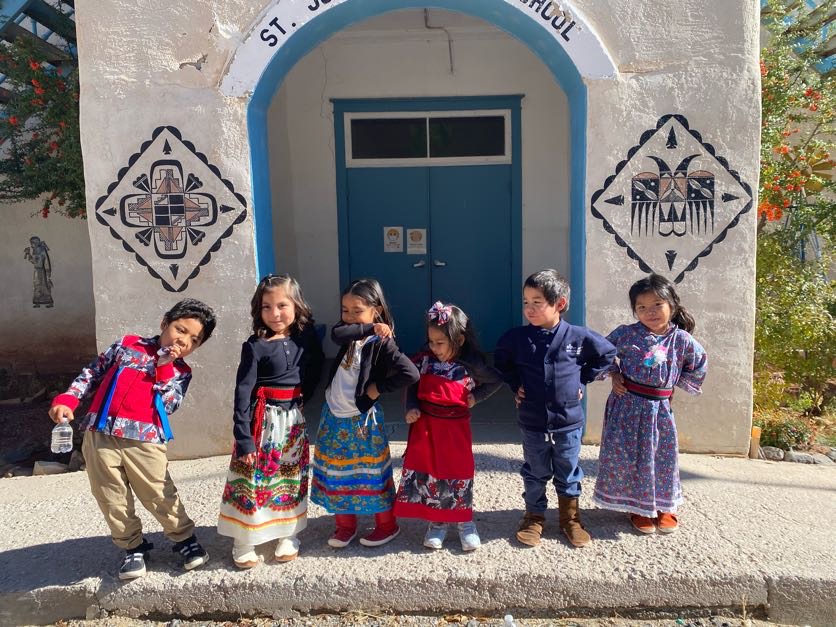
PreK students joyfully celebrate Indigenous Peoples Day at St. Joseph Mission School with excitement and enthusiasm!
That moment’s cultural relevancy and creativity are possible because of the Better Way Foundation partnership. We are enhancing our spaces in ways that bring in our Indigenous culture and language. Last year, a local seamstress created Pueblo dolls and traditional attire—alongside the costumes of doctors, police officers, and firefighters—for our dramatic play area. Cultural language specialists labeled basic items around the classroom in Keres from the play fruits and vegetables to the table.
Now, we can hold family and community events that enhance our relationships and build ties for our students between their school and home lives. Every month we bring a cultural leader from the Acoma or Laguna Pueblos who leads us in Native songs, dancing, and storytelling. They wear traditional attire, and we eat a family-style traditional meal together. Increasingly, we have requests from families that don’t have children at the school to attend.
Our teachers make our classroom a safe, fun, loving, and culturally rich environment for our Pueblo Acoma and Pueblo Laguna children.
The Better Way Foundation supports our autonomy to create programs that work for us, our students, and our communities—and will have a lasting impact on our children well into the future. For Indigenous people, healing comes from within, and we will heal as individuals and communities when we center the traditions and practices of our ancestors.
Tonya Louis is the early childhood director at St. Joseph Mission School and brings experience providing culturally based public health, behavioral health treatment, prevention, and intervention models to the role through her work with various tribal and non-tribal service agencies.
| Better Way Foundation support launched a two-year initial implementation of a Native language and cultural preservation pilot program for pre-K and kindergarten classrooms. With the funding the school will build a retained and skilled educator workforce; offer professional development; strengthen early childhood education; and promote early literacy and learning, as well as cultural, physical, and mental well-being.
The programs will promote Indigenous culture and language continuing to incorporate cultural specialists, preserve cultural heritage, integrate culturally relevant instructional materials and culturally appropriate elements of evidence-based curriculum; and increase meaningful family and community engagement. |
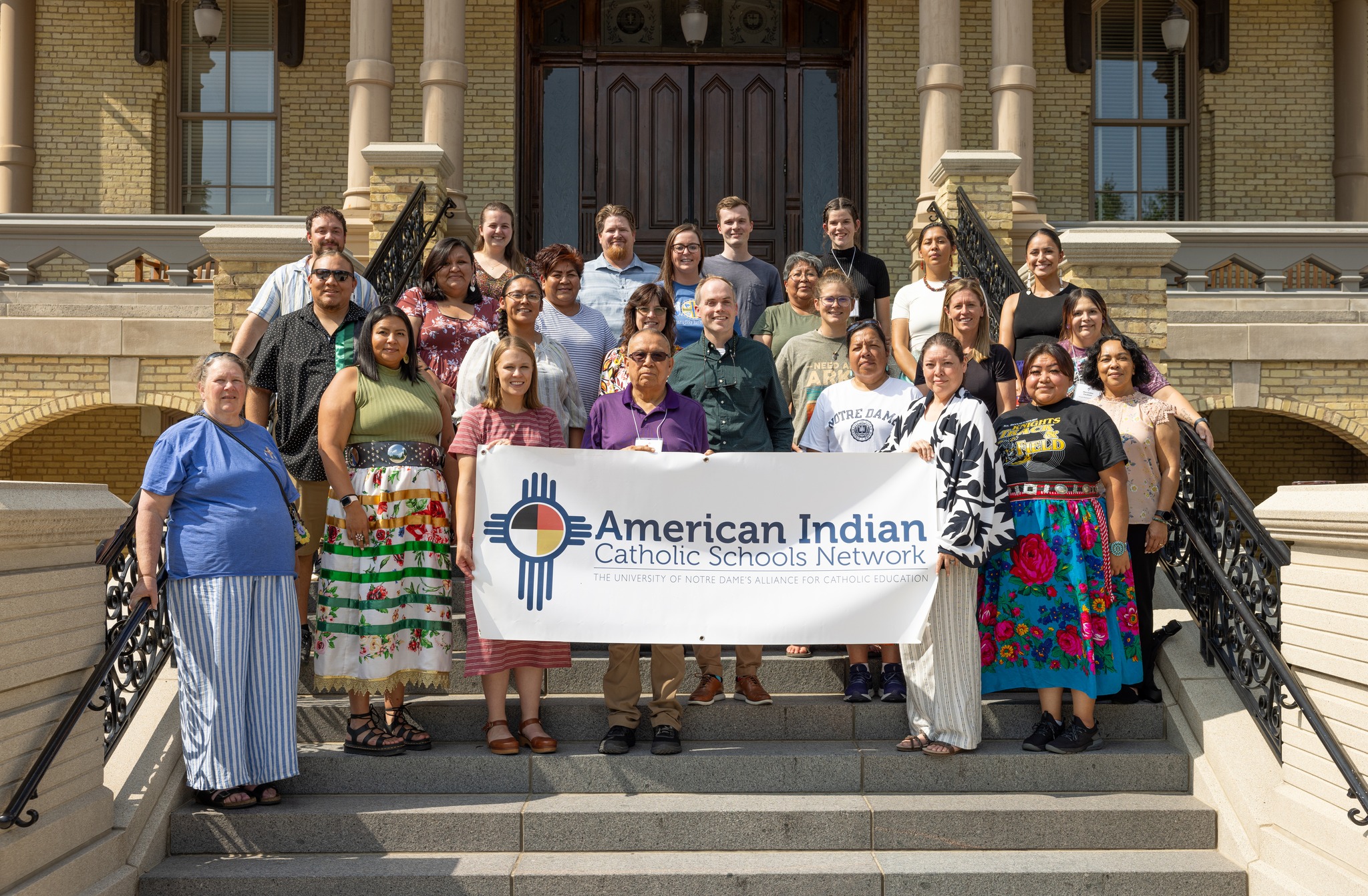
Our investments in the American Indian Catholic Schools Network and its member schools support Truth and Healing at former Native catholic boarding schools. These efforts range from growing Native language speaking to teacher development.
“Through our partnership with Better Way, together with our member organizations we gained essential skills in strategic planning, fundraising, and communication—tools that equip us with strategies to take our work to the next level. These learnings will ensure the sustainability of the impactful initiatives Better Way has supported in our organization over the years, allowing us to continue building on the foundation laid for long-term success in helping children to develop to their full potential.” – Mwajuma Rwebangila, Executive Director, TECDEN
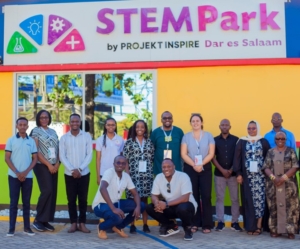 Our partnerships in Tanzania will conclude in 2025. To support our partners through this transition, we provided subsidized technical assistance training with Mama Hope. This initiative equipped them with tools for system strengthening, collaboration, and long-term progress, including diversifying revenue-generating activities.
Our partnerships in Tanzania will conclude in 2025. To support our partners through this transition, we provided subsidized technical assistance training with Mama Hope. This initiative equipped them with tools for system strengthening, collaboration, and long-term progress, including diversifying revenue-generating activities.
Responsible Exit in Tanzania, featuring Mama Hope
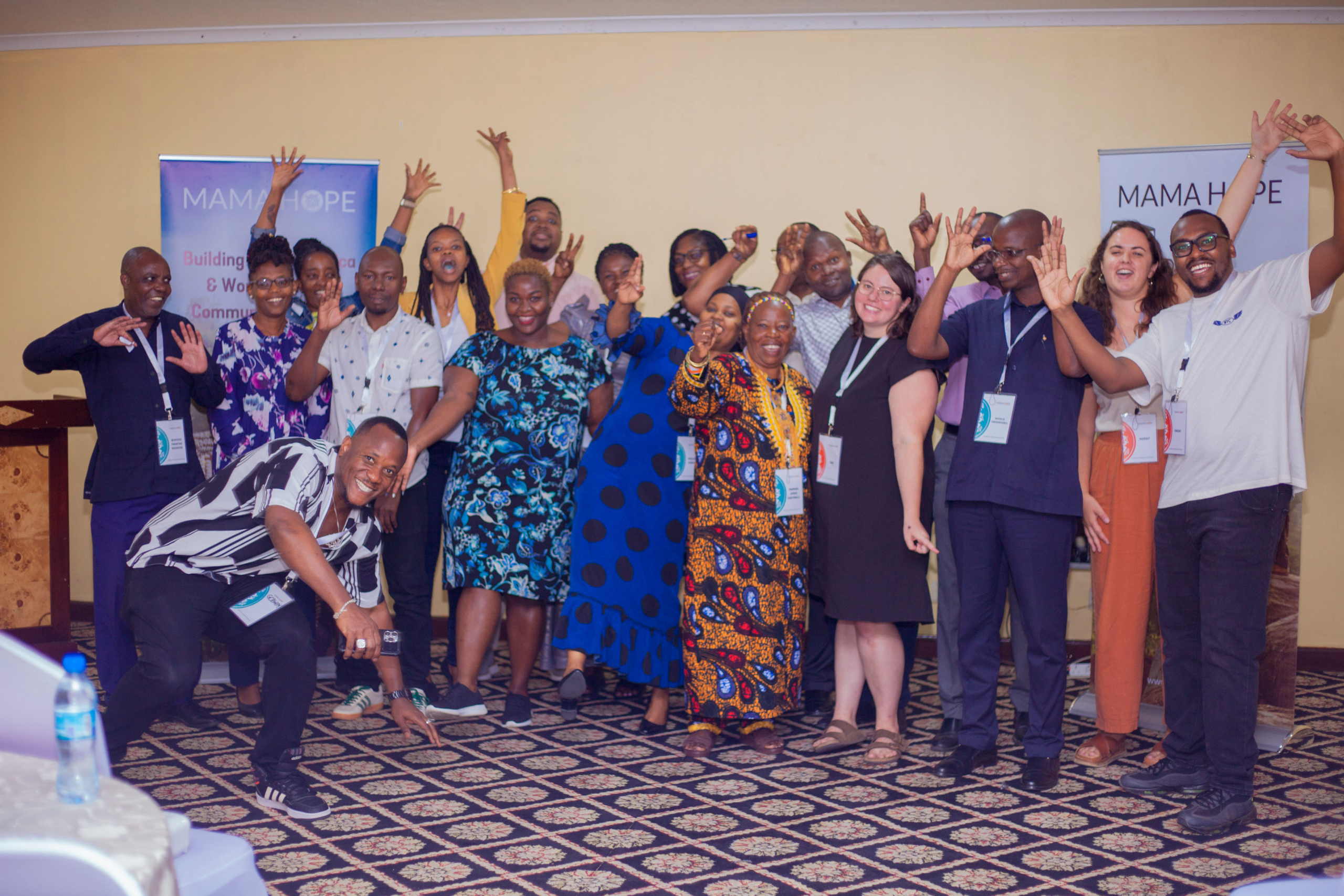
With Mama Hope’s support, Tanzania partners presented to the Segal Family Foundation, German Embassy, and Foundation for Civil Society, utilizing newly developed storytelling and fundraising skills.
As our Tanzania partnerships conclude in 2025, we partnered with Mama Hope to support a smooth transition. They led a five-day technical assistance bootcamp, equipping partners with tools for system strengthening, collaboration, and sustainability in early childhood development.
Partners refined storytelling to better engage funders, identified dozens of new funding opportunities, and 85% reported feeling more prepared for long-term success. Mama Hope also helped partners like the Organization for Legal Assistance and Tanzania Home Economics Association expand income-generating initiatives, such as a coffee agribusiness and sweet potato value chain, strengthening both ECD programs and financial sustainability.
This initiative fostered lasting collaboration among Tanzanian ECD partners, ensuring continued shared learning and innovation.
We are aligning our investments with the mission, vision, and values of Better Way, while driving both social impact and financial returns.
We began by making program-related investments in Native Community Development Financial Institutions, and in recent years, we’ve redirected 36% of our assets to impact investments, including shifting cash to Native banks and alternative investments.
Investing in Native CDFIs, for instance, provides access to financial products and services like home loans, business training, and financial education. Our goal is to expand economic opportunity for Indigenous communities, amplifying the impact of our grants and partners’ efforts.
Lakota Vogel and Alissa Benoist: Driving social impact, strengthening community
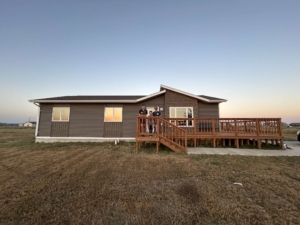
Ashley Elk Nation & her two sons enjoy their new home.
At Four Bands Community Fund, a Native Community Development Financial Institution in Eagle Butte, S.D., our first audience is always community—our core offering is opportunity.
While traditional financing is transactional and standardized, our lending products center on relationships with the understanding that everyone’s financial footprint is different. Four Bands is a place to grow. If people are courageous enough to enter our doors, we’ll guide them in achieving their goals through education, financing, and incubation. These services, along with advocacy, comprise our Theory of Change.
Four Bands provides the core knowledge that individuals and first-generation entrepreneurs need to build assets, whether they want to buy a house or start a business. Then, we create access to capital through various business and consumer lending products. Incubation includes support and wrap-around services, establishing a minimum eight-year relationship with our clients. Our advocacy aims to overturn systemic barriers.
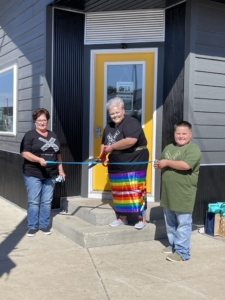
Kelsie Kay’s Coffee Depot grand opening.
Every year our loan fund pushes out around $9.5 million. In the past four years, we’ve developed a mortgage lending portfolio of 85 homeowners, including Ashley Elk Nation. A single mother with two sons, Ashley contacted Four Bands to apply for a mortgage; she wanted a safer neighborhood for her children than her single-wide mobile home afforded. A Four Bands loan officer walked Ashley through the construction and lending processes, breaking down all the details. Today Ashley and her boys enjoy their porch and large yard, and the peace that comes with living on the outskirts of town. Ashley loves that the house is more permanent, as her sons will always have that place to call home.
Through its program-related investment, the Better Way Foundation creates opportunities for community members like Ashley and her children. Often the investments in individuals extend beyond their front door: Most Four Bands clients start businesses that address community needs and are of service to Native people.
At Four Bands, we believe how you perceive is how you proceed. We are from the community and live here so we perceive opportunity, not risk. In the outside world, they perceive risk and operate accordingly. We take pride in finding solutions to build up the opportunities within our communities, such as the local coffee shop that’s thriving! It turns out our community members love a good caramel macchiato.
Lakota Vogel is the executive director and Alissa Benoist is the director of programs at Four Bands Community Fund.
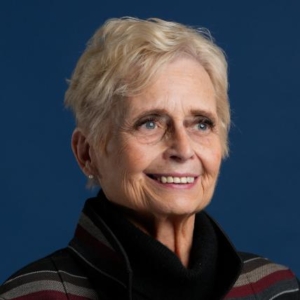
Better Way’s journey is one of continuous learning, reflection, and growth. We are committed to being a strong partner, a responsible steward of the philanthropic resources entrusted to us, and an organization that deeply listens to and learns from our partners. While this work is ongoing, we have intentionally woven our purpose and the foundation’s values into every aspect of our work—not just grantmaking, but everything we do. – Janine Geske, Board Member
Indigenous communities possess the wisdom to create impactful solutions—they just need the resources to bring them to life
We are committed to learning from their experiences, understanding historical trauma, and evolving our approach to be an effective partner.
This year, we deepened our engagement through:
Looking ahead, we remain committed to:
Our goal is to be a true partner—walking alongside communities to nurture lasting impact. Inspired by their resilience, we honor our founders’ legacy by supporting child well-being, strong families, and thriving communities.
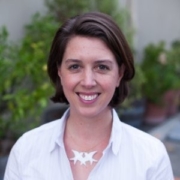
Insights gained during our Board retreat this past year—such as learning about the historical and ongoing significance of Owámniyomni in Minneapolis as a site of Indigenous resilience and reflecting on local homeless encampments—underscore the interconnected opportunities within Indian Country. These lessons remind us to engage holistically, aligning our grantmaking to elevate programs and the ecosystems in which they exist. – Gia Rauenhorst, Board Member
Our investments currently support 28 Indigenous communities (gold represents federally recognized Tribal land)
Karen Rauenhorst | Chair
Judy Rauenhorst Doerr | Chair-Elect
Janine Geske | Vice Chair & Governance Chair
Stephanie Russell | Finance & Investment Chair
Tarajean Yazzie-Mintz | Program & Impact Co-Chair
Dr. Cary Buzzelli | Program & Impact Co-Chair
Anita Fineday
Gia Rauenhorst
Shamsia Ramadhan
Tom Jollie
Jeff Rauenhorst
Mark Rauenhorst
Dr. Melody Redbird-Post
Nicholas Banovetz | Executive Director
Fadumo Malow | Program Officer
Daisy Lor | Program Assistant
Mariah Mendez | Intern
Thank you, Karen and Tarajean, for your leadership!
Karen Rauenhorst served 13 years on the Board, including four years as Chair. Her leadership guided us through key transitions, while her compassionate and inquisitive approach—always centering partners and founders’ intent—strengthened our governance and best practices.
Tarajean Yazzie-Mintz served five years on the Board, including helping Chair our Program & Impact Committee. She provided strategic guidance in building our partnership and evaluation frameworks. Her vision, thought partnership, and advocacy for programs furthest from opportunity have inspired us to reimagine philanthropy.
Better Way’s vision, rooted in my parents’ commitment to the well-being of all children, reminds us that we must listen deeply, learn humbly, and walk alongside communities.
In partnership, we strive to honor their wisdom, resilience, and leadership as they shape a stronger future for their children and families. – Judy Rauenhorst Doerr, Chair-elect
Pictured left: Henrietta and Gerald Rauenhorst
Explore previous reports: 2023 Annual Report | 2022 Annual Report | 2021 Annual Report